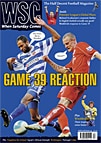 Richard Scudamore’s assault on the English language as he tried to defend “Game 39” was his only option, believes Taylor Parkes, because the bullshit stopped him having to face up to how flawed the scheme is
Richard Scudamore’s assault on the English language as he tried to defend “Game 39” was his only option, believes Taylor Parkes, because the bullshit stopped him having to face up to how flawed the scheme is
Much has been said in the past few weeks about the insane premise and fundamental absurdity of “Game 39”. Still, one question has not been asked: when Richard Scudamore spoke endlessly of “host-city event-management expertise”, told Radio 5 Live that “we think it is a ten-year play in terms of protecting our domestic position”, and argued that his scheme “allows us to grasp the globalisation nettle”, because “I would be criticised wholly if we let the league stray into the slow lane while others passed us in the fast lane” – who did he think he was talking to?
This kind of corporate language is used routinely by the new rulers of football. “The global marketplace”; “product”; “a strategy for growth”. To most people, this gibberish is irritating at best, at worst utterly alienating – a fact so well established that it has become a cliche, a tired joke about lavatory firms boasting of “bowel evacuation solutions”. Still, it grows.
So it is easy to roll one’s eyes at the idiocy of Big Football, with all its high-powered PR, talking to fans in a language they despise. The truth, here as in modern politics, is that this jargon is not (just) self-important posturing, it’s necessary to the project. It enables cognitive dissonance, hypnotises its users into believing that they’re not behaving monstrously, offers insulation against those unfortunate truths that might threaten the absolutes of free-market thinking. More than this, it’s a way to push through unpalatable ideas, jargonised to the point of incomprehensibility (for instance, the increased use in football of the word “customer”, a term whose politeness disguises its real intent: to subtly shift the perception of ownership). The ugly argot is crucial to “thinking the unthinkable” – like “collateral damage”, these phrases help the hideous seem banal.
When the cloak of bullshit is temporarily cast aside, everything sounds as nasty and grasping as it really is, as when Setanta Sports asked Scudamore how hometown, season-ticket-holding fans fit into all this. “They will be able to go and see it,” he shrugged. “There’s nothing stopping them going.” Suddenly remembering that actually, there is something stopping them going, he pointed out helpfully that “it costs money to go from Newcastle to London” (all sums under £50,000 being, presumably, fiddling small change and thus indistinguishable). Eventually, our exasperated bigwig went for a strange compromise: “Not everybody will be able to go, but there will be an element of the fanbase that goes.” And everyone knew what he meant. Forced into almost-straight talking, unable to refer to this element as “a high-prestige elite consumer demographic”, he sounded almost embarrassed.
(After a while, though, this stuff gets into your blood. When the “forces of reaction” had him a corner, Scudamore even huffed in boardroom jargon. “If it’s deemed not to be worth it,” he said, “we will think again about our global expansion.” He sounded like nothing so much as a foiled sci-fi baddie, staring wild-eyed into the middle distance and slamming a gloved fist down on his enormous desk.)
What he cannot grasp is this: when your plans are scuppered by the relative astuteness of Sepp Blatter, your problems run deeper than the scuppering of your plans. This is not just a case of poor handling of the national game. It’s a fundamental misunderstanding of what the game is. The corporate language betrays a corporate mindset that is fundamentally incompatible with every aspect of sport – any sport. Consider the man’s response to criticism from UEFA: “UEFA have their own competitions,” he said. “They therefore are in competition with us. We do realise that.” It was simply impossible for him to conceive of any objection not rooted in “the realities of the marketplace”.
Michel Platini may not be quite the man of the people he’d like us to think, but it fell to the fêted Donovan lookalike to introduce a note of sanity by pointing out (perhaps even sincerely) that the role of UEFA is to “protect the game from business”. An opinion that, in the telling phrase of a sneering Scudamore, “doesn’t rise much above the view of people in the corner of the pub”. Yeah, those idiots. Shut up, unviable revenue streams. This has nothing to do with you.
It’s old hat to launch impassioned broadsides about “the soul of the game”, weeping for rosettes and rattles. Perhaps there never was a golden age, but the mill owners, local dignitaries and pork-business entrepreneurs of football’s past loved power and money like a pig loves muck: they saw no need to cloak or justify greed with self-righteous babble. True, that old‑fashioned grabbiness, which lives on in men such as Blatter, helped twist football into ugly new shapes. But it’s the unhinged hubris of Scudamore and his ilk, whose ludicrous doublespeak separates them from reality as surely as it makes them sound like wankers, that threatens to destroy it altogether.
From WSC 254 April 2008